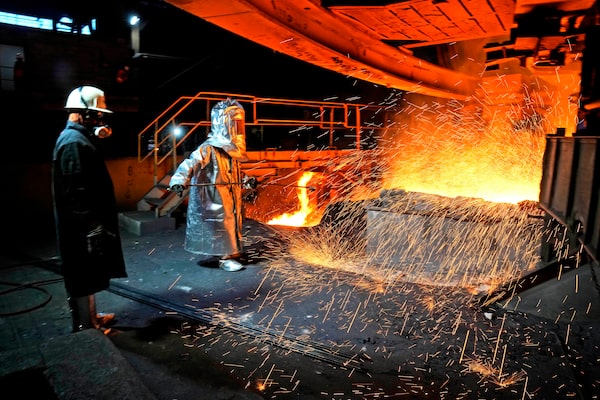
A worker in a protective suit pokes a metal rod to tap slag from a smelting furnace at PT Vale Indonesia's nickel processing plant in Sorowako, South Sulawesi, Indonesia, Tuesday, Sept. 12, 2023.Dita Alangkara/The Associated Press
Federal Natural Resources Minister Jonathan Wilkinson says Canada and other Western countries could consider imposing tariffs against Indonesia and China because of the potential for market manipulation stemming from their stranglehold on the global nickel market.
Indonesia has gone from supplying 7 per cent of the global supply of nickel to 55 per cent in the past decade, with much of that new production controlled by China-based mining companies with ties to the authoritarian Beijing government.
A glut of new global supply has caused the steel-making commodity to plummet by more than 80 per cent, from a peak of US$100,000 a tonne just two years ago, to around US$17,500 a tonne.
“You’ve seen some manipulation in the rare-earths market over the past number of years, but the most pressing area where we have concerns about the way in which the market is being managed is nickel and Indonesia, where very large amounts of nickel are being brought on by Chinese-controlled entities,” Mr. Wilkinson told The Globe and Mail earlier this week.
“It opens us up to situations where the market can in some ways be manipulated,” said Mr. Wilkinson. “That is not only an economic concern for countries like Australia and Canada, but it is a national-security concern for the United States, Europe, Canada, Japan, every Western country.”
China has already locked up a dominant position in other critical minerals, such as lithium, cobalt and graphite, all of which are key minerals used in electric-car batteries and other forms of lower-carbon energy sources.
When asked if tariffs should be imposed on nickel coming out of Indonesia, Mr. Wilkinson said tariffs could be part of several strategies that could be considered.
“As Western countries that share common values, we need to come to some kind of solution together,” he added.
Indonesia has already engaged in anti-competitive trade practices in the nickel market, which has hurt the West. In 2020, it banned the export of raw nickel in a move aimed at attracting even more foreign investment into the country from China. The European Union complained to the World Trade Organization that the export ban was hurting its steel industry.
The crash in the nickel price is putting tremendous pressure on large Western producers. Canada’s First Quantum Minerals Ltd., Switzerland’s Glencore PLC and Australia’s Wyloo Metals Pty Ltd. are closing mines, idling production and issuing bleak forecasts.
Melbourne-based BHP Group Ltd., the world’s biggest mining company by market value, recently estimated that about half of all nickel production globally is money-losing, as the company incurred a US$2.5-billion impairment charge in its nickel business.
Mr. Wilkinson said that the mine shutdowns that have played out in Australia will “eventually come to Canada.”
Australian Resources Minister Madeleine King is in awe at the speed at which Indonesia built up its nickel industry but also extremely concerned about the damage it has wrought on Australian nickel producers.
“It has created a 200,000-tonne surplus of nickel into the market, which won’t be depleted for a number of years, and that puts pressure on every other nickel producer,” she said in an interview.
China and Indonesia’s rise in nickel production has come at a great environmental cost. Already one of the dirtiest industries, steel produced using low-grade Indonesian nickel, known as nickel pig iron, or NPI, is highly carbon intensive thanks in part to the reliance on thermal coal for power in China and Indonesia. In addition, the processing of NPI for use in the EV industry, including the use of metallurgical coal, adds greatly to emissions.
Data from a study out of Sweden showed that Indonesian nickel processed for EVs produces five times more greenhouse-gas emissions than high-grade nickel sourced from Western producers.
Ms. King said she would like to see market players create a new pricing mechanism for nickel that might see metal that is mined and processed in a more sustainable fashion trade at a premium to the current standard commodity contract that is quoted on the London Metals Exchange. The LME doesn’t take into account the provenance of the metal.
“We are pushing for recognition of those higher standards in the pricing,” she said.
She is also encouraging car companies to be more transparent about their nickel sources, and would like them to highlight metal that comes from jurisdictions such as Australia where environmental standards are higher. She is, however, against the idea of car companies labelling Indonesian-sourced nickel with a black mark.
“It’s more to highlight that another product has done its best, and it has got a sustainable supply chain,” she said.
A major question remains, she acknowledges, over whether consumers will be willing to pay more for products that use nickel mined and processed with less environmental damage, or if price will trump everything.
“If you want electric vehicles and the batteries that go in them to be made more sustainably, you will need to buy your nickel or your lithium from countries that have the highest ESG and worker safety standards, and that does cost more,” she said.